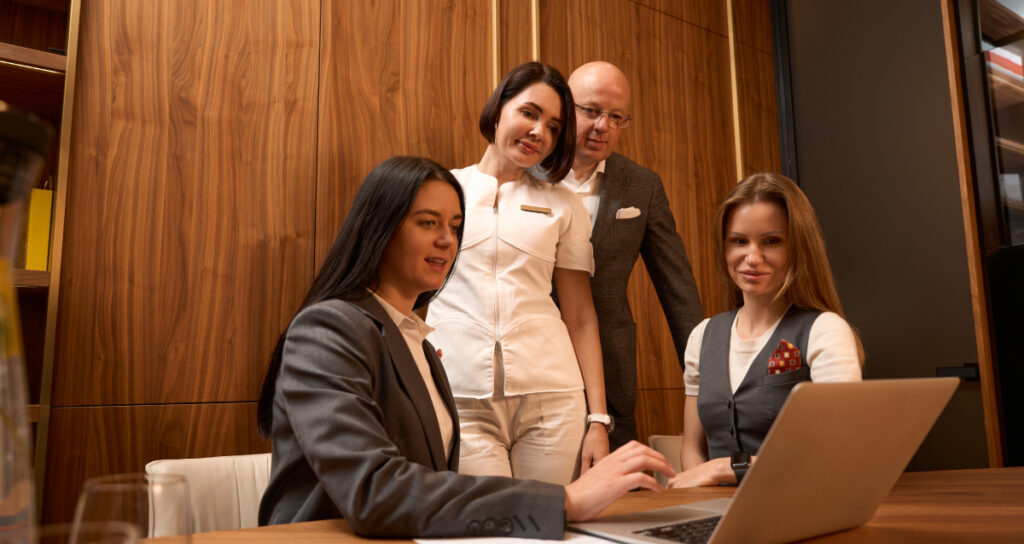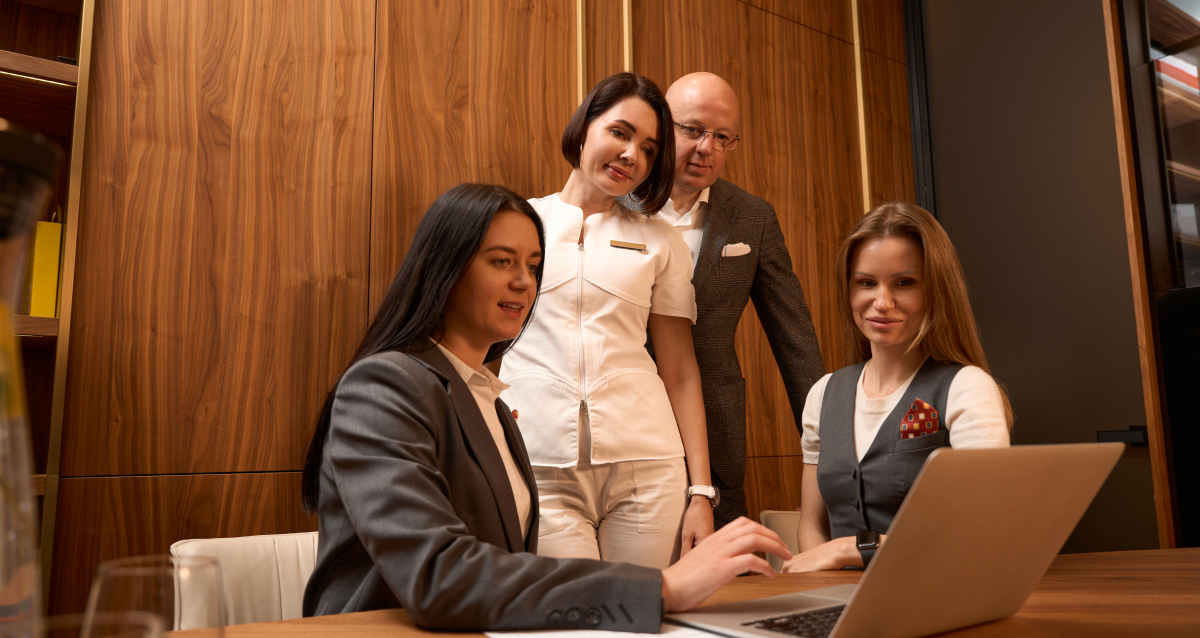
Corporate hospitality programs serve as valuable opportunities for companies to strengthen their brand, cultivate relationships, and create positive experiences for stakeholders. They can also contribute to business growth, loyalty, and long-term success.
This blog explains business hospitality programs and 5 quick tips for their smooth execution and successful results.
What is a Corporate Hospitality Program?
A business hospitality program is a strategic initiative undertaken by a company to create and strengthen relationships with various stakeholders.These programs typically involve hosting events, outings, or experiences aimed at providing entertainment, networking opportunities, and fostering goodwill.
Corporate hospitality programs can take many forms, including:
- Client Entertainment: Hosting clients at sporting events, concerts, dinners, or other leisure activities to build rapport and strengthen business relationships.
- Partner Engagement: Arranging special events or activities for business partners, suppliers, or distributors to enhance collaboration and mutual support.
- Employee Recognition and Appreciation: Organizing events such as company retreats, team-building outings, or employee appreciation days to boost morale.
- Investor Relations: Hosting investor meetings, shareholder events, or exclusive briefings to update stakeholders on company performance, strategy, and future plans.
- Community Engagement: Participating in community events, charity fundraisers, or volunteer activities to demonstrate corporate social responsibility.
Suggested Read: Increase Employee Engagement in 8 Simple Ways
5 Quick Tips for Corporate Hospitality Programs
Let’s have a look at some corporate hospitality tips:
1. Set Clear Objectives
Define specific and measurable objectives for your hospitality program. Some major objectives of hospitality in business travel are:
Building Client Relationships
- Strengthen connections with existing clients by providing them with memorable experiences of hospitality in business travel that foster trust and loyalty.
- Create opportunities for meaningful interactions between clients and company representatives to deepen understanding and rapport.
Increasing Sales
- Use corporate hospitality events as platforms to showcase products or services and highlight their value proposition to potential clients.
- Facilitate networking and relationship-building opportunities between sales representatives and prospects to nurture leads.
Boosting Employee Morale
- Acknowledge and appreciate employees’ contributions by organizing enjoyable and inclusive events that recognize their efforts.
- Foster a sense of belonging and camaraderie among team members by encouraging participation in team-building activities and social interactions.
Enhancing Brand Visibility
- Use hospitality in business travel events as a platform to showcase the company’s brand identity, values, and unique selling propositions to a targeted audience.
- Leverage event attendance to generate positive word-of-mouth recommendations and referrals from satisfied attendees.
2. Personalize Experiences
Tailor your corporate hospitality program to the preferences and interests of your guests. Collect information about their preferences, hobbies, and dietary restrictions in advance, and use this information to customize the experience.
You can personalize experiences by doing the following:
- Pre-event Survey: Send out a pre-event survey to attendees to gather information about their preferences, interests, and dietary restrictions.
- Customized Invitations: Tailor invitations to reflect the interests or hobbies of each guest, showcasing activities or experiences they may enjoy.
- Menu Customization: Work with catering services to accommodate dietary restrictions and preferences, offering a variety of options to cater to different tastes.
- Activity Selection: Offer a range of activities or entertainment options during the event to cater to diverse interests, such as guided tours, workshops, or interactive experiences.
- One-on-One Interactions: Encourage company representatives to engage in one-on-one conversations with guests, discussing topics of mutual interest and forging genuine connections.
- Follow-up Communication: After the event, follow up with attendees to thank them for their participation and gather feedback on their experience, further demonstrating a commitment to personalization and customer satisfaction.
3. Focus on Quality Over Quantity
Focusing on quality over quantity entails that rather than spreading resources thin across multiple events, the emphasis is placed on curating fewer but meticulously planned experiences that resonate deeply with attendees.
This involves investing in premium venues renowned for their ambiance and prestige, as well as selecting top-tier catering services known for their exceptional quality and attention to detail.
By prioritizing quality, companies demonstrate a commitment to excellence and customer satisfaction, ultimately fostering stronger relationships with clients, partners, and employees.
Moreover, these high-quality corporate hospitality experiences are more likely to generate positive word-of-mouth recommendations and enhance the company’s reputation in the long run, making it a worthwhile investment in building brand equity and goodwill.
4. Encourage Engagement and Interaction
Design your corporate hospitality events to encourage interaction and networking among attendees. Incorporate icebreaker activities, group discussions, or team-building exercises to facilitate meaningful connections. Some more include:
- Networking Opportunities: Designate dedicated networking areas or facilitate structured networking sessions to allow guests to connect with each other, exchange contacts, and explore potential collaborations or partnerships.
- Engage with Experts: Arrange opportunities for guests to engage with company representatives, industry experts, or keynote speakers through Q&A sessions, panel discussions, or meet-and-greet opportunities, enabling them to gain insights and ask questions.
- Interactive Presentations: Opt for interactive presentations or workshops where attendees can actively participate, share their experiences, and contribute to the discussion, fostering a dynamic and engaging environment.
5. Measure and Evaluate Success
Utilize tracking tools and systems to monitor and analyze relevant metrics throughout the event lifecycle, from pre-event registrations to post-event follow-ups. This may include monitoring attendance numbers, tracking sales leads generated, or measuring social media engagement.
- Client Satisfaction Scores: Implement feedback mechanisms to assess attendee satisfaction and experience.
- Sales Conversions: Measure leads generated and track their progression through the sales pipeline.
- Return on Investment (ROI): Calculate the event’s cost-effectiveness and financial benefits.
Plan your Event Travel Better with itilite
When organizing an event, leverage the capabilities of the itilite corporate travel management solution to streamline your processes. With this platform, you gain visibility into attendee lists, allowing you to easily identify who is attending and who is not. Furthermore, you can effortlessly send updates and notifications to attendees, keeping them informed about any changes or important details.
Additionally, itilite enables you to track and manage itineraries efficiently, ensuring smooth travel arrangements for all participants. By utilizing these comprehensive features, you can optimize event organization and enhance the attendee experience with ease and efficiency.
To know more, book a free demo today.













